In this article we’ll discuss the birth of human civilization through the evolution from foraging to farming.
What is foraging?
Foraging is searching for wild food resources
Foragers don’t modify their environment, they deal with it.
Fundamentally, this is the most eco-friendly form of subsistence.
The ability to forage is influenced by 4 main factors:
- Learning: how you can adapt to your environment to maximize the efficiency of your efforts.
- Genetics: how your genes are evolving over time to improve your foraging capacity.
- Predators: how risk impacts your foraging endeavours.
- Parasitism: how parasites can impact your sources of procurement.
Foragers can source food alone or in groups (solitary vs. group foraging).
Hunting-gathering, a form of foraging, was humanity’s earliest form of food procurement, for as long as 90% of our collective history to this day.

What is farming?
Farming is the activity or business of growing crops and raising livestock.
Farmers modify and control their environment.
Agriculture is the practice of farming.
The Neolithic Revolution was the (First) Agricultural Revolution.
It was marked by the wide-scale transition from hunting-gathering to agriculture and settlement.
It all started around 12,000 years ago (10,000 BC), with some earlier indications around 14,500 years ago.
Farming is believed to have begun in what is known as the Fertile Crescent in the Levant region, which stretches from northern Egypt through Israel and Jordan to the shores of the Persian Gulf… at the crossroads between Africa and the rest of the world.
Source: University of Cambridge
This was the beginning of the Holocene, our current geological epoch, after the last Glacial Period.
Humans learned how to domesticate animals and plants (which became crops).

Goats were probably the first animals to be domesticated.
Wheat is the first cereal to be cultivated by man.
One theory is that pastoralism (a form of animal husbandry where domesticated animals (known as "livestock") are released onto large vegetated outdoor lands (pastures) for grazing) constituted the transition between hunting-gathering and sedentary farming, when hunters of wild goats & sheep started following the herds on their seasonal rounds, before domesticating them. It’s worth noting that there are still today between 200 million and 500 million people globally practising pastoralism.
Originally, the Neolithic Revolution narrowed the diversity of food, which had a negative impact on human nutrition compared to the foraging days.
This evolution also marked a major cultural shift: the origins of a sedentary lifestyle.
Sedentary settlements paved the way for centralized administrations and political structures.
The earliest known civilization, characterized by the development of a political state, social stratification, urbanization, and symbolic systems of communication beyond natural spoken language (a writing system), developed in Sumer (Southern Mesopotamia, now Southern Iraq) around 4,500 BC. History started with writing.
Property, Wars & Tools
Even if “property” only came to a legal definition in the 17th century (in England), we can argue that with the advent of agriculture arose the systematic need to enforce and protect field boundaries, by all possible means, including violent ones.
Moreover, the obvious payoff from domestication ignited humans’ desire to conquer land for farming purposes.
In the hunting-gathering days, most violent acts were limited to personal conflicts, typically revolving around mating issues. They grew in scale when humans started to formalize their associations.
Farming would pull the trigger for territorial conflicts.

On the positive side, the advent of farming allowed for a diversification in human activity.
Now settled, not forced to spend their days in the wild hunting and gathering food, humans started traveling, trading and communicating.
They also developed tools to facilitate their farming efforts.

